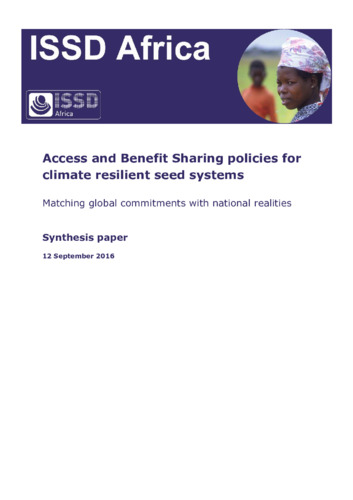Access and benefit sharing policies for climate resilient seed systems: matching global commitments with national realities.
This synthesis paper provides a summary of main findings on climate resilient seed systems and access and benefit sharing of case studies from Uganda, Rwanda, Zambia and Zimbabwe. This study analyses what is actually happening at the national and subnational levels in terms of climate change, its impacts on particular crops, what experiences countries have had to date in terms of accessing, using and sharing benefits derived from genetic resources for climate change adaptation, and what kinds of ABS policy initiatives or reforms could help those countries to make better use of genetic diversity for climate change adaptation in the future. This study is designed to analyze how these different ‘threads’ come together at national and subnational level in the four countries.
Findings from these studies indicate that countries are already facing climate change which is affecting farmers and shaping their needs in terms of suitably adapted seed. As a result, the countries are embracing (inter and intra specific) crop diversification as a means to adapt to climate changes. This depends upon accessibility, availability and use of inter and intra specific crop genetic diversity from local, national and international sources. The proportion of PGRFA in the countries’ national genebanks that is potentially adaptable to that country’s changing climate is decreasing over time (as climates change more). National level research and the development of new varieties is also not sufficient to meet these demands. Countries are therefore becoming more interdependent. There are also significant constraints on ability to access, use and share benefits associated with materials in other countries as a result of the lack of on-line accession level documentation (and linked implementation of ITPGRFA and Nagoya Protocol) and lack of proper polices, legislation and guidelines on ABS.
The study therefore recommends that international partnerships and programmes are important mechanisms for the exchanges of genetic resources into and out of the four countries for agricultural research and development especially at regional level and that the ITPGRFA and Nagoya Protocol are not self-executing agreements but need to be proactively implemented. In addition, considerable investment in capacity building is necessary for stakeholders – including farmers – to be able to exchange genetic resources in a way that makes seed systems more resilient.

